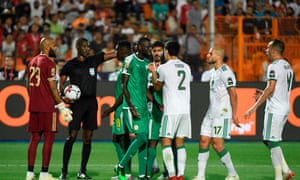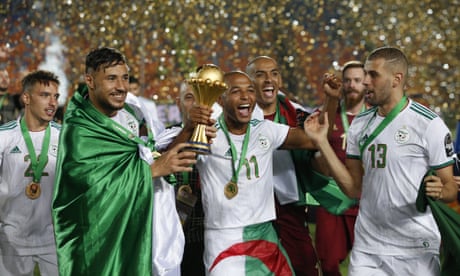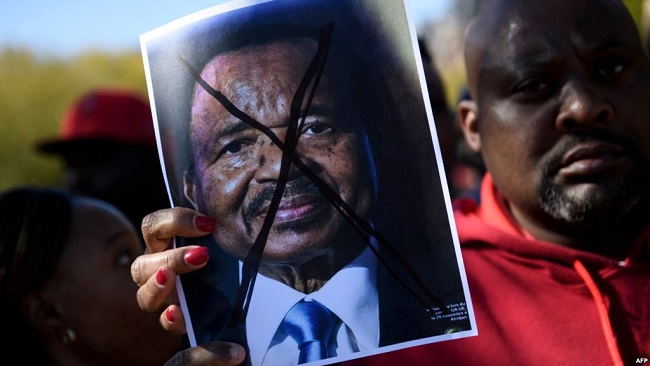20, July 2019
Algeria claim second Afcon title after Bounedjah’s lucky strike sinks Senegal 0
The record books may not show exactly how Algeria won their first Africa Cup of Nations since 1990 and, in any case, it is probably best left to the imagination. Their performances over the past month merit the accolade and that much cannot be denied; the pity was that they dropped any pretensions towards making this final a footballing spectacle after going ahead through Baghdad Bounedjah’s heavily deflected early goal, the result being a tedious encounter that grabbed the attention only during those few episodes when it seemed Senegal might punish their voracious lust for attrition.
It all amounted to a colossal riding of their luck but also a personal triumph for Djamel Belmadi, their impressive coach, who took the job only last August but has delivered a continental title where none was expected. He celebrated with his players, who raced towards a delirious 15,000-strong travelling support at full-time, while his childhood friend Aliou Cissé held a lengthy on-pitch debrief after narrowly failing to deliver Senegal a first title of their own.
Senegal 0-1 Algeria: Africa Cup of Nations 2019 final – as it happened
Cissé might have had better fortune if the referee, Neant Alioum, had not reversed a second-half penalty award, given when the ball struck Adlene Guedioura’s right arm, after a VAR consultation. Spot kicks have certainly been awarded for less in major finals this year. But ultimately Senegal ran into too many of the traps Algeria set for them and the moments when Sadio Mané, as well as the rest of a vaunted front line, could influence proceedings were vanishingly rare.
“I’m so happy for my people, who have waited for such a long time,” Belmadi said. “We have won the cup outside our country for the first time. If you look at where we came from, I took a team that faced difficulties. To achieve what we have achieved, to finish on top of Africa, I have to say it is excellent.”
Despite the deeply frustrating fare they produced, this was indisputably a meeting of the tournament’s two best teams. In the end Algeria capitalised on the slight edge they held.
They had beaten Senegal by a single goal in the group stage and repeated the trick through their one attempt of the game, a moment that briefly confused the stadium into silence.

Boundejah’s burst down the inside-left channel past Lamine Gassama oozed menace but the shot he produced after cutting inside, which looped high into the air off Salif Sané, seemed destined for the athletics track behind the goal. But it spun downwards sharply, eventually dropping into the far corner, and the dawning realisation took a few moments to morph into unbridled delight.
Sané, injured earlier in the tournament, had returned to the starting lineup in place of the suspended Kalidou Koulibaly and Senegal’s weakness had been highlighted in the unluckiest fashion.
It did not take a doctorate in Algerian football ethics to divine that, from there, Belmadi’s side might seek to niggle this all the way out. They have played some fine attacking football in Egypt and such a grim final does not erase any of that. But few have quite as firm a handle on the dark arts and they successfully squeezed the air out of what followed.
“They say you don’t play finals, you win them,” Belmadi said. “I don’t really believe that. We prepared and wanted to play against this talented team, Senegal. It wasn’t our best match. We didn’t have ball possession nor impose our play.”

Algeria deserved their Afcon triumph but a shame they decided to win ugly
In fairness it made some sense to cede the initiative to Senegal, for whom guile has long been an achilles heel. If their opponents began to get too clever, Algeria simply stuck spokes in the works. Aissa Mandi felled Mané with a crude challenge led from the knee and Ismaïla Sarr found himself on the end of a hack from Ramy Bensebaini. Sofiane Feghouli collapsed near the goalline before dusting himself down when sympathy proved in short supply. When tempers briefly flared on the half-time whistle, their substitute goalkeeper Alexandre Oukidja took a dramatic tumble while Cissé and Mandi argued their way down the tunnel.
The break felt like a relief from the sheer cynicism of it all but the game did open up enough for Senegal to believe they had found a way back. Sarr, their best attacker on the day, made excellent ground down the right before seeing his cross hit Guedioura inside the area. It recalled Mané’s slice of fortune for Liverpool in Madrid two months previously but this time, after a delay of around a minute, Alioum opted to restart with a drop ball.
“We played well and had our chances over the course of the match but against this aggressive bloc we couldn’t find a solution,” Cissé said. Mbaye Niang, from a tight angle after rounding Rais Mbolhi, and Sarr did spurn opportunities to make Algeria regret stalling to such an extreme degree. By the conclusion, though, their dirty work had been done to a strange, unsatisfactory perfection.
Source: The Guardian





























21, July 2019
South Africa: President Ramaphosa accused of misleading Parliament 0
A South African watchdog on Friday said President Cyril Ramaphosa “deliberately misled” Parliament about a campaign contribution, a setback for a leader who has vowed to address sprawling graft allegations that forced his predecessor from office.
The report was released as that former president, Jacob Zuma, abandoned his testimony to a high-profile state commission probing wide-ranging allegations of graft in government and state-owned companies. Zuma, who denies the allegations against him, asserted he was being treated unfairly. But a deal was quickly reached for him to return at some point in the future.
The outcry over years of alleged corruption during Zuma’s stay in office has shaken both the economy of South Africa, the most developed in sub-Saharan Africa, and public support for the ruling African National Congress. The party has been in power since the end of the harsh system of racial segregation known as apartheid 25 years ago.
Now the ANC faces an internal struggle between allies of Ramaphosa and Zuma, who led South Africa from 2009 to 2018 when he resigned under party pressure and was replaced by former deputy Ramaphosa.
The current president has repeatedly vowed to fight corruption and win back public confidence.
Friday’s report by South Africa’s public protector, a constitutionally created office that probes alleged misconduct in state affairs, said Ramaphosa “deliberately misled” lawmakers late last year about a 500,000-rand ($34,000) campaign contribution from the CEO of a local company, Africa Global Operations, formerly Bosasa. The report called on the national director of public prosecutions to investigate further.
In response, a statement posted by Ramaphosa’s office asserted that he was not guilty of the accusations and calls on the public protector to allow the president a hearing.
A political analyst and researcher at the University of the Western Cape, Ralph Mathekga, said Ramaphosa should be careful about how he handles the watchdog’s report, saying it might hurt the president further if he loses at court.
“This report gives a lot of ammunition not only to his detractors within the ANC but to the Economic Freedom Fighters as well, as they will exploit it to take him on,” Mathekga said, referring to a populist opposition party that along with the leading opposition Democratic Alliance had filed complaints alleging wrongdoing.
Separately on Friday, Zuma abruptly cut short his appearance at the state inquiry and his lawyers said the former president would no longer participate. But soon afterward the commission chair, deputy chief justice Raymond Zondo, said an agreement had been reached to allow Zuma to return at a later stage.
The commission has no power to prosecute but other authorities could follow up on its findings.
Zuma began his nationally televised testimony this week by calling the graft allegations part of an international intelligence conspiracy that began more than 25 years ago to assassinate his character. On Friday he threatened to expose “spies” if the pressure on him went too far.
Zuma has been questioned about his close relationship with the wealthy Gupta family and allegations that they exerted influence over cabinet appointments and the awarding of lucrative state contracts.
A defiant Zuma told supporters on Friday that he had been the target of many assassination attempts because he has a lot of information about spies who infiltrated the ANC during apartheid. He was once the ANC’s intelligence chief.
“I know a lot about spies, that was my job,” he said. “I have never played around with that information. But if people now want me to uproot them, I will.”
(AP)